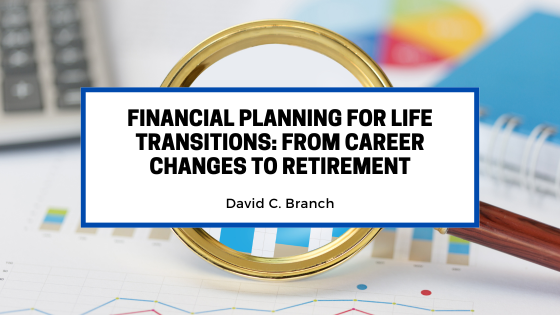Life is full of transitions—some planned, others unexpected. From switching careers to retiring, these shifts often come with emotional and financial uncertainty. That’s why effective financial planning is critical during times of change. It helps you stay grounded, make informed decisions, and protect your long-term financial security.
Career Changes: A Time to Reevaluate
Whether you’re pursuing a new passion, facing a layoff, or seeking better work-life balance, changing careers affects your income, benefits, and financial goals. Start by reviewing your budget. Do you need to adjust your spending while transitioning? Creating a temporary financial cushion—ideally three to six months of expenses—can reduce stress and give you flexibility.
Next, consider your retirement contributions. If you’re leaving an employer, decide whether to roll over your 401(k) into an IRA or transfer it to a new workplace plan. Evaluate your health insurance options and make sure there are no coverage gaps. This is also a good time to revisit your career-related goals and assess whether additional training or education is necessary—and how you’ll fund it.
Marriage, Divorce, and Family Dynamics
Major life events like marriage or divorce require a thorough review of your financial situation. In marriage, merging finances can mean shared goals, but also differing spending habits. Consider creating joint financial plans while maintaining some individual accounts for autonomy.
Divorce, on the other hand, often involves dividing assets, revising estate plans, and reevaluating retirement strategies. Consulting with a financial advisor and estate attorney can help ensure fair settlements and updated beneficiary designations.
The addition of children—either through birth or adoption—adds another layer of planning. Start saving for education early with tools like 529 plans, and reassess your life and disability insurance needs to protect your growing family.
Retirement: Planning the Paycheck-Free Years
Retirement is a major milestone that requires more than just saving. As you approach retirement, shift your focus from accumulation to income planning. How will you draw down your assets? What’s your strategy for Social Security benefits? Do you have a plan for healthcare expenses, including long-term care?
Creating a sustainable withdrawal strategy—such as the 4% rule or a bucket strategy—can help manage risk and maintain your lifestyle. Consider diversifying your income sources, including pensions, annuities, and part-time work or consulting, to reduce reliance on portfolio withdrawals.
Tax planning becomes increasingly important in retirement. By strategically timing withdrawals from tax-deferred accounts, you can minimize your tax liability and preserve more of your wealth.
The Importance of Flexibility
Financial planning during life transitions isn’t just about numbers—it’s about staying flexible and resilient. Your goals, values, and circumstances will evolve. Regular check-ins with a financial advisor can ensure your plan stays aligned with your changing life.
Final Thoughts
Life transitions are inevitable, but financial uncertainty doesn’t have to be. By proactively planning for each stage—whether it’s a career pivot or the journey into retirement—you gain clarity and confidence to move forward. With the right financial roadmap, you can turn life’s changes into opportunities for growth and stability.

